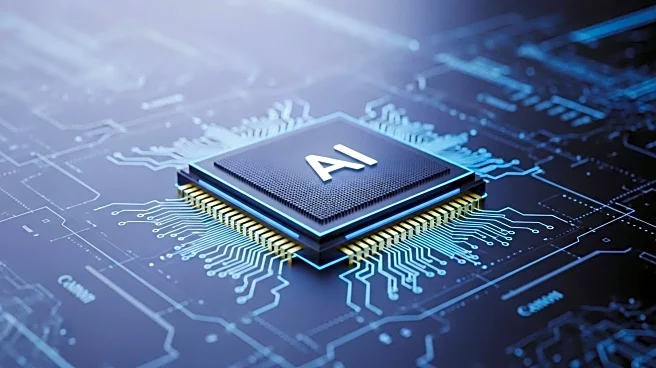What's Happening?
OpenAI is set to commence large-scale production of its own artificial intelligence chips next year, in collaboration with U.S. semiconductor company Broadcom. This initiative aims to reduce OpenAI's dependence on Nvidia hardware and address the increasing demand for computing capacity required to train and operate AI models. The chips are intended for internal use rather than external sales. Broadcom's CEO, Hock Tan, confirmed a significant $10 billion chip order from an undisclosed client, widely reported to be OpenAI, which led to a 15% rise in Broadcom's shares. This move aligns with strategies adopted by other tech giants like Google, Amazon, and Meta, who have developed specialized processors to manage AI workloads more efficiently.
Why It's Important?
The partnership between OpenAI and Broadcom marks a significant shift in the AI industry, as companies increasingly seek to develop in-house hardware solutions to meet growing computational demands. By producing its own chips, OpenAI aims to enhance performance, reduce costs, and mitigate supply chain risks associated with reliance on external suppliers like Nvidia. This development could influence other AI companies to pursue similar strategies, potentially reshaping the semiconductor market. Additionally, the initiative supports OpenAI's broader Stargate project, which aims to expand AI infrastructure across the U.S., impacting sectors such as healthcare, defense, and finance.
What's Next?
OpenAI's collaboration with Broadcom is expected to begin strong shipments next year, as confirmed by Broadcom's CEO. The Stargate initiative, led by OpenAI in partnership with SoftBank and Oracle, plans to deliver 4.5 gigawatts of capacity across multiple U.S. locations. This project, unveiled by President Trump, aims to build a network of AI data centers to support various sectors. OpenAI also plans to construct a significant data center in India, further expanding its global AI infrastructure. The company is exploring partnerships with national governments to build local AI data center capacity, enhancing data sovereignty and industry growth.
Beyond the Headlines
OpenAI's strategic move to produce its own AI chips highlights the growing trend of tech companies investing in custom hardware to optimize AI operations. This shift could lead to increased competition among semiconductor manufacturers and drive innovation in chip design. The Stargate initiative's focus on building AI infrastructure across the U.S. and globally underscores the importance of robust data centers in supporting AI advancements. By partnering with governments, OpenAI aims to foster local industries and ensure data privacy and compliance, potentially influencing global AI policy and infrastructure development.









